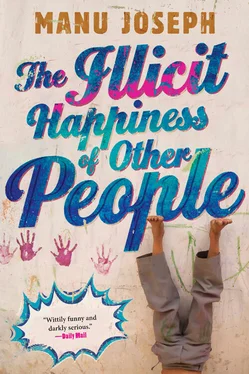He told her about a man who lived not very far away. He was a good man, an ordinary man. A good father and a good husband, which were terms used very often in her house, as a rebuke, a longing or satire, depending on who was talking. The man returned from work one day, had his dinner as he always did, played with his children and went to bed. He had two children, a girl and a boy, which emphasized his normalcy. Next morning he told his wife and children that he was going away for ever, that he could not explain why he was going away. He left in his nightclothes, taking nothing with him, not even his toothbrush. He never came back.
Unni narrated these stories as if he had a faint idea where such men were going and what they hoped to do with the rest of their lives. Some days, she saw Unni standing on the balcony, looking carefully at everything around him. He told her there were rogues among the birds, too, who went against the natural flow of life, who behaved in unexpected ways. It is a clue, he said, and he said that with a shy smile. ‘Something is going on, Mother.’ Maybe he was just a boy who liked to look at life around him and he invented the mysteries to grant a greater meaning to an idleness that was not tolerated any more in the new nervous city where a boy had so much maths to learn. She told him, ‘You must look, Unni, you must just stand and look at life for hours. If you were born in a village as I was, you would not need a reason, you would not need the high infidel thoughts that are not sanctioned by the pope.’
There was so much peace in her boy. That was why the mosquitoes drank from him. He slept without moving an inch, like a corpse.
The murmur of the men rises. Mariamma pats her sari, and goes to the kitchen balcony to see what has happened. The commotion has naturally charmed all the women of Block A to their tiny balconies, where the sun is unbearable at this time of day. In normal circumstances they appear here at noon only to hang their secrets out to dry. This is the rear side of the building and there is an imagined discretion to all activities here, unlike at the front, which apparently faces the world.
As she is on the third floor she has a good view of the doctor’s house in the neighbouring plot, which shares a wall with Block A. It is a small independent house with a proud woman’s rose garden. Its door is wide open and all around the jute doormat that says ‘Welcome’ there are lots of footwear, chiefly male footwear. Several men are standing in the garden and talking among themselves with their arms folded. The signs are unmistakable but the women of Block A decide to ask what has happened anyway. They lean over the balcony railings, hold their chests to keep their saris from falling and whisper their queries. The men walk down the garden towards the common wall as if they are about to urinate, which is not beyond them. They look up and whisper to the women what has happened. And the chatter of women begins, which drives away the sparrows.
The women stand on their balconies and discuss the matter with the women on the other balconies. Some of them lean dangerously, with half their bodies in the air, to speak to women directly below, who in turn are twisted around their spines as they look up. They speak diagonally too. They also peep through the windows of their neighbours to announce the news to the old, who are probably lying on their hard beds and begging to know what has happened. And word soon spreads that the smart young doctor has been found dead in his chair, his Walkman attached to his ears, a feeble music still coming from it.
Those who live on the ground floor of Block A, whose view is hindered by the wall, have moved to the homes that are on the higher floors. They may have gone without any clever ruses. Just rang the bell, and walked to the view in brisk gloom.
Word now spreads that the doctor, whose age they had never known, was forty-two years old. It is somehow appropriate that the age of such a fine man must be an even number. Late in the morning, when his wife had left home for the market, there was nothing wrong with him. He seemed fine. When she returned after an hour and rang the doorbell, there was no response. She peeped through a window to look inside and found him sitting in his chair with his eyes open. He was not moving. She tossed a brinjal at him, which hit him, but he did not react. She ran to a neighbour for help, and soon several men appeared outside her house. They broke open the door.
This is how it happens, always. Every now and then, they hear these stories, which are all the same. The wife rings the bell and the door does not open. It is broken by the neighbours. Inside, they find, in poses that are generally granted only to the living, the corpse of a man who was in the middle of a routine. In fact, the children know these stories too, and their greatest fear is that they will return from school one day and find a lot of footwear outside their door.
A hush falls; it appears that something important is about to happen. The women wait, but nothing happens. So the murmur returns, and word spreads that someone has gone to fetch the doctor’s only child, a girl of fourteen, who is at school. She will not be immediately told about her father’s death. She will be led out of her classroom on some other pretext so that she does not faint or wail on the streets. She will soon appear at the mouth of the narrow lane that leads to her house and walk down the path, unaware that her life has changed, wondering why so many people are standing on their balconies and staring at her. She will be here soon, in a sky-blue pinafore. And everybody will get to see a rare spectacle — of a girl who is about to learn that her father is dead.
Women from the other three blocks of Balaji Lane have begun to arrive, and the swarms of housewives on the balconies of the higher floors begin to swell. Chairs too must have come out because some people have now lost their height. One woman sombrely hands carrots to another woman on the next balcony. The chatter grows and the air is filled with the little things they know about heart attacks. There is probably no Tamil word for it yet. They say it in English — Heart Attack. Some who are prone to eloquence call it ‘cardiac arrest’. In the buzzing hive, Mariamma stands alone. Nobody speaks to her.
She wonders why a woman would go to the vegetable market in this unearthly heat, why would a woman go to the market at noon? She looks carefully at the porch of the dead doctor’s house. There is no bag there, no vegetables. A woman returns from the market and rings the doorbell. Her husband does not respond. She peeps through a window and finds him sitting in a chair motionless, his eyes wide open. What would she do? She would drop the bag. If her purse is in it, she may take it out. That is acceptable. But she would leave the bag there. And she would scream for help. But nobody heard a woman scream. It was the time of day when one could hear even the sudden wind from the aged in other houses. Even if she had run quietly to the neighbours, being a slim, refined woman and all that, where was the bag? Neighbours broke open the door, and as she ran in she took the vegetables inside? Or, later, as she was wailing beside the corpse of her husband, the neighbours took the bag in? All this is against human nature. But then Mariamma asks, ‘Mariammo, what are you suggesting?’
Mariamma is not suggesting anything. She is just thinking. As a girl who grew up far away from the city, in a forest of rubber trees on a giant hill, she remembers the time when men were strong and they moved like alluring beasts. When a man died young those days, in mysterious circumstances, people looked carefully at his wife. Now, things are different, nobody is surprised when a man goes young, people have given a name to such a death.
Читать дальше












